Related Research Articles
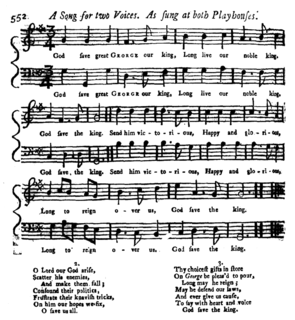
"God Save the Queen", alternatively "God Save the King", is the national or royal anthem in most Commonwealth realms, their territories, and the British Crown dependencies. The author of the tune is unknown, and it may originate in plainchant, but an attribution to the composer John Bull is sometimes made.

John Milford Rutter is an English composer, conductor, editor, arranger, and record producer, mainly of choral music.

"Gloria in excelsis Deo" is a Christian hymn known also as the Greater Doxology and the Angelic Hymn/Hymn of the Angels. The name is often abbreviated to Gloria in Excelsis or simply Gloria.

Lobgesang, Op. 52, is an 11-movement "Symphony-Cantata on Words of the Holy Bible for Soloists, Choir and Orchestra" by Felix Mendelssohn. After the composer's death it was published as his Symphony No. 2 in B-flat major, a naming and a numbering that are not his. The required soloists are two sopranos and a tenor. An organ is needed too. The work lasts almost twice as long as any of Mendelssohn's purely instrumental symphonies.

A Christian child's prayer is Christian prayer recited primarily by children that is typically short, rhyming, or has a memorable tune. It is usually said before bedtime, to give thanks for a meal, or as a nursery rhyme. Many of these prayers are either quotes from the Bible, or set traditional texts.
Phos Hilaron is an ancient Christian hymn originally written in Koine Greek. Often referred to in the Western Church by its Latin title Lumen Hilare, it has been translated into English as O Gladsome Light. It is the earliest known Christian hymn recorded outside of the Bible that is still in use today. The hymn is part of vespers in the Byzantine Rite, and also included in Catholic and some modern Anglican and Lutheran liturgies.
"For the Beauty of the Earth" is a Christian hymn by Folliott S. Pierpoint (1835-1917).

Psalm 100 is the 100th psalm in the Book of Psalms in the Hebrew Bible. In English, it is translated as "Make a joyful noise unto the Lord, all ye lands" in the King James Version (KJV), and as "O be joyful in the Lord, all ye lands" in the Book of Common Prayer (BCP). Its Hebrew name is מִזְמוֹר לְתוֹדָה, 'Mizmor l'Todah' and it is subtitled a "Psalm of gratitude confession". In the slightly different numbering system in the Greek Septuagint version of the Bible, and in the Latin Vulgate, this psalm is Psalm 99. In the Vulgate, it begins Jubilate Deo, or Jubilate, which also became the title of the BCP version.
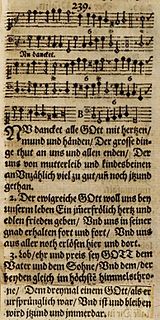
"Now thank we all our God" is a popular Christian hymn. Catherine Winkworth translated it from the German "Nun danket alle Gott", written c. 1636 by the Lutheran pastor Martin Rinkart. Its hymn tune, Zahn No. 5142, was published by Johann Crüger in the 1647 edition of his Praxis pietatis melica.

"Wachet auf, ruft uns die Stimme" is a Lutheran hymn written in German by Philipp Nicolai, first published in 1599 together with "Wie schön leuchtet der Morgenstern". It appears in German hymnals and in several English hymnals in translations such as "Wake, Awake, for Night Is Flying", "Wake, O wake! with tidings thrilling", and "Up! Awake! From Highest Steeple". Johann Sebastian Bach based a chorale cantata on the hymn, Wachet auf, ruft uns die Stimme, BWV 140, one of its many musical settings.

John Rutter's Gloria is a musical setting of parts of the Latin Gloria. He composed it in 1974 on a commission from Mel Olson, and conducted the premiere in Omaha, Nebraska. He structured the text in three movements and scored it for choir, brass, percussion and organ, with an alternative version for choir and orchestra. It was published in 1976 by Oxford University Press.
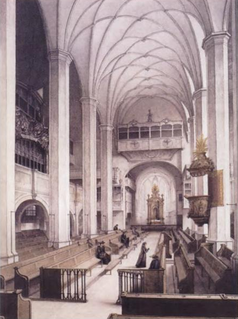
Gottlob! nun geht das Jahr zu Ende, BWV 28, is a church cantata by Johann Sebastian Bach for the Sunday after Christmas. He first performed it on 30 December 1725.
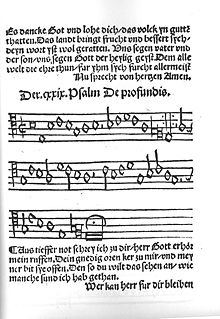
Aus tiefer Not schrei ich zu dir, BWV 38, is a church cantata by Johann Sebastian Bach. He composed the chorale cantata in Leipzig in 1724 for the 21st Sunday after Trinity and first performed it on 29 October 1724.
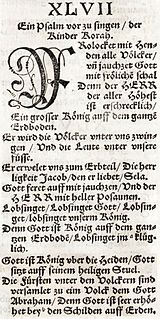
Psalm 47 is the 47th psalm of the Book of Psalms, beginning in English in the King James Version: "O clap your hands". The Book of Psalms is the third section of the Hebrew Bible, and a book of the Christian Old Testament. In the slightly different numbering system used in the Greek Septuagint and Latin Vulgate translations of the Bible, this psalm is Psalm 46. In Latin, it is known as "Omnes gentes plaudite manibus". The psalm is a hymn psalm. It is one of twelve psalms attributed to the sons of Korah, and one of fifty-five psalms addressed to the "Chief Musician" or "Conductor".

Nun danket alle Gott, BWV 192, is a church cantata for Trinity Sunday composed by Johann Sebastian Bach in Leipzig in 1730. It is an incomplete cantata, because its tenor part is missing. It is a chorale cantata, setting the unmodified three stanzas of Martin Rinckart's "Nun danket alle Gott". It has been regarded as an expansion of Bach's chorale cantata cycle.

The Magnificat by John Rutter is a musical setting of the biblical canticle Magnificat, completed in 1990. The extended composition in seven movements "for soprano or mezzo-soprano solo, mixed choir, and orchestra " is based on the Latin text, interspersed with "Of a Rose, a lovely Rose", an anonymous English poem on Marian themes, the beginning of the Sanctus and a prayer to Mary. The music includes elements of Latin American music.

"All Creatures of Our God and King" is an English Christian hymn by William Henry Draper, based on a poem by St. Francis of Assisi. It was first published in a hymn book in 1919.

"Praise, my soul, the King of heaven" is a Christian hymn. Its text, which draws from Psalm 103, was written by Anglican divine (clergyman) Henry Francis Lyte. First published in 1834, it endures in modern hymnals to a setting written by John Goss in 1868, and remains one of the most popular hymns in English-speaking denominations.

"Lasst uns erfreuen herzlich sehr" is a hymn tune that originated from Germany in 1623, and which found widespread popularity after The English Hymnal published a 1906 version in strong triple meter with new lyrics. The triumphant melody and repeated "Alleluia" phrases have supported the tune's widespread usage during the Easter season and other festive occasions, especially with the English texts "Ye Watchers and Ye Holy Ones" and "All Creatures of Our God and King".
"For the beauty of the earth" is a sacred choral composition by John Rutter, a setting of the hymn of the same name by Folliott S. Pierpoint. The work was published by Oxford University Press in 1980. Recorded several times, it has been described as "one of Rutter's more popular, enduring anthems".
References
- 1 2 "John Rutter / Now thank we all our God / No. 1 of Two Hymns of Praise". Oxford University Press. 1974. Retrieved 11 June 2014.